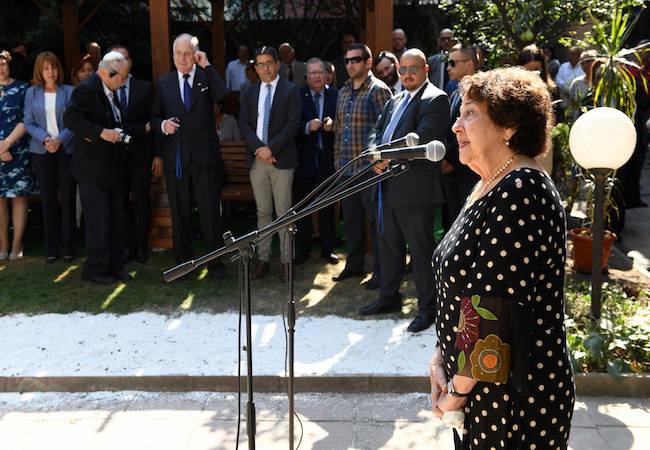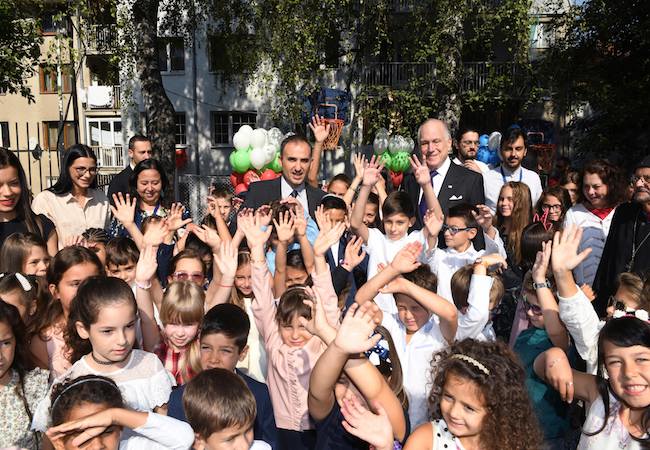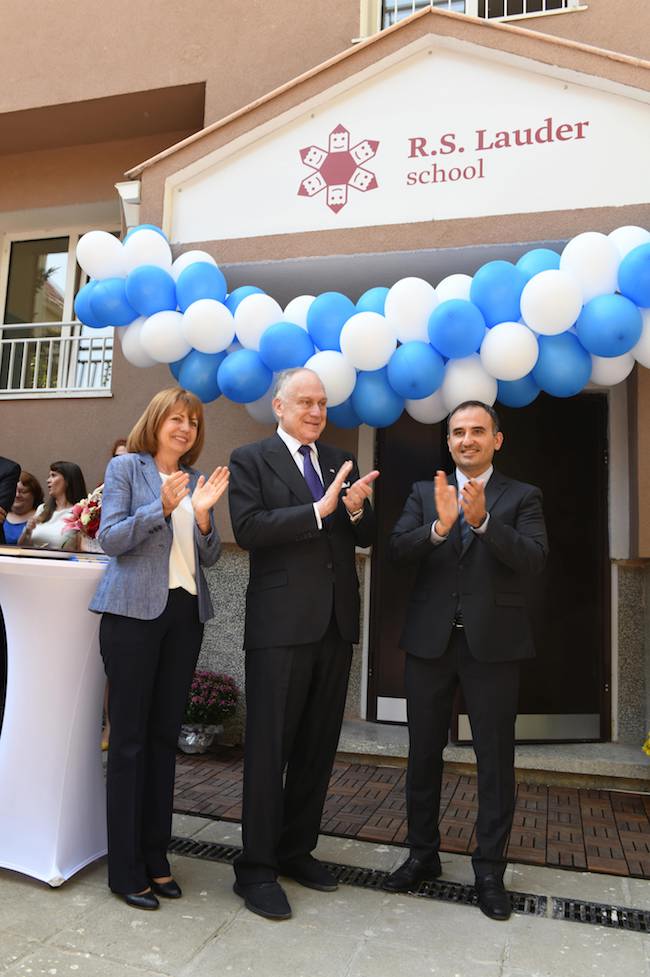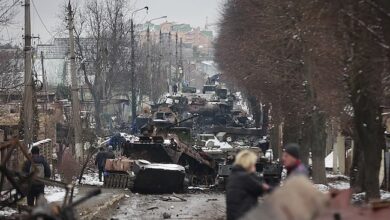Planting the seeds of Jewishness through education and responsibility
Discussion with Chief Executive of “Shalom” Mrs. Julia Dandolova
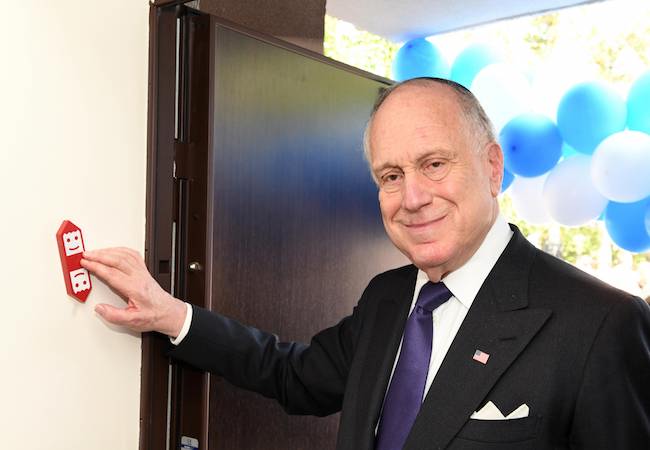
By Alexander Woodman – Sofia, Bulgaria
The Ronald S Lauder Day School inauguration took place last month in Sofia, Bulgaria, and became a milestone achievement for the Jewish community in Bulgaria over the past 20 years.
This school is a result of vision and enthusiasm of Bulgarian Jewish community members, and the organization of the Jews in Bulgaria “Shalom.”
The idea to establish a school for children of Bulgarian Jewish community, received instant patronage and support from the Ronald S Lauder Foundation, and the American Jewish Joint Distribution Committee in 2017. The initial faith in success to create a professional educational environment for young generation of Jewish community became the essential factor of the successful implementation of this institution.
The Ronald S Lauder Day School will teach Hebrew and Jewish experiential learning classes ten hours per week. Reflecting on Mr. Lauder, the president of the World Jewish Congress stated: “What do we want from the school? We want the children to be proud of being Jewish. In order to be proud, they have to know what they are proud of, and why.”
One of the missions of the school is “Tikkun Olam” the Jewish philosophy of “Heal the World” – to live purposefully for the community and society at large. All the members of the team strongly believe in this valuable approach towards education. Today, the professional staff of the school is passionate to deliver academic excellence, promote the importance of social engagement through freedom and respect to each other.
I had an excellent opportunity to have a discussion with the first Jewish school in decades, Chief Executive of “Shalom” Mrs. Julia Dandolova.
A.W. As the CEO of the governing body of the Jewish community of Bulgaria, please share some of the challenges you face in your day-to-day operations? What was your vision at the onset of this school project, and what was your original approach to success?
J.D. Even though our community is relatively small, “Shalom;” the Organization of Jews in Bulgaria, oversees a large number of our activities. “Shalom” is an independent, public, and self-governing organization that oversees a large number of the most popular activities. We often say that our community members receive care from age 0 to 105, and with the life expectancy increasing, we now provide services to super-centennials.
Furthermore, “Shalom” is not only the primary care provider for Holocaust survivors, but we also run an intricate welfare system for people of all ages. This group is considered to be the prime political body representing the Bulgarian Jewish community on issues related to the government. In this capacity, the board often needs to make statements regarding matters of anti-Semitism, hate speech, and discrimination against other minorities in the country.
Where does education fit into this plan? I would say it is part of every aspect of our projects. Learning is one of the most important of Jewish values, and we try to incorporate it into all our activities. We already maintain a kindergarten; however, it seemed that once children moved into public school, much of the material they had been taught; was forgotten. Therefore, our vision was to create a system that was sustainable; strong enough to give our children a chance to follow Jewish tradition. This would be based on our Jewish values and help each person become a contributing member of our community and the Bulgarian society.
A.W. One of the most important goals of the “Shalom” organization is to provide high-quality education for its members. How do you integrate community involvement in the educational process of the literate generation of Bulgarian Jews?
J.D. We are not trying to save time, energy, or resources when we invest in the educational system. Our education teams have the finest specialists in their fields, and we work to assure that what they learn during the education process is not only related to school issues but can be used in their lives outside of the classroom.
Bulgarian public education also tries to keep parents at a distance. They are not involved or aware of the school policies and how their children are educated. These policies mean that parents are also kept away from sharing the excitement of the educational successes of their children and their emotional growth. For that reason, we are very focused on parent involvement. We insist that the parents and the Jewish community become very involved with the school and their activities. We are delighted that many community members donate most of the library books that our students use. Parents are also involved in assembling the furniture before the beginning of school each year. This is one of the ways that we ensure the passing of knowledge and tradition from generation to generation.
A.W. A CEO of an educational institution is supposed to be a leader and set an example for the new generation of educators and students. What qualities would you like to instill into this new generation of Bulgarian Jews? What are your concerns about being in this highly regarded position?
J.D. The main values taught to our children are done mainly through Tikkun Olam; a Jewish theory defined by acts of kindness done to perfect the world. It is often used when discussing issues of social policy, to safeguard those who are at a disadvantage. Many values are taught, especially freedom and respect towards one another and the environment. This teaching is focused on children; an attempt to encourage their opinions, personal skills, and creativity.
A.W. You once said that “communities need mentors, too. We need reminders. We need somebody to help us see the bigger picture. Being a self-sustainable community does not mean doing it alone.” In your opinion, who are our most influential leaders? How do you intend to raise a generation of leaders in school?
J.D. I personally believe in teaching by example. Children will want to become strong leaders if they see people who they admire and want to follow in their paths. Therefore, it is important to be honest and responsible and make decisions that support the values of the Jewish doctrine. If children see these types of role models, they will respect their education, their community, and their leaders.
A.W. OJB “Shalom,” the Organization of the Jews in Bulgaria (OJB), developed the concept of a non-formal education, which believed in the process that learning through experience and job sharing, is the key to a strong formal education. When considering the ‘new school,’ what features of this approach will be combined with the formal educational model?
J.D. Experiential learning is a significant part of the general learning process. We would want our students not only to learn the material but also to reflect on what they are learning. The hands-on approach to learning moves away from only having the teacher the front of the room imparting information and merely transferring their knowledge to students. We try to allow learning to be an experience that moves beyond the classroom. We want our students to strive to gain a more involved way of understanding the world and their self-awareness, as well.
A.W. How much of ‘Chesed,’ the concept of decency and mercy, will be incorporated into the new educational system of school that opened on September 15th, 2019?
J.D. Using the concept of ‘Chesed,’ with our students will help us strive to promote a sense of responsibility to serve the Jewish people and all of humanity. This, we feel, will lead to a sense of kindness to improve the world. The students will complete meaningful projects which will give them a chance to volunteer not only within the community, but to work to eliminate injustice around the world.
A.W. The Center for Jewish-Bulgarian cooperation, “Aleph,” was founded to develop the cultural, social, and economic ties between the Bulgarians and Bulgarian Jews. What do you think are the most appropriate indications of collaboration between Bulgarian Jews and Bulgarians today?
J.D. Jews have lived in this territory for nearly two millennia; they are completely incorporated in the current Bulgarian society. We have talented artists, scientists, business people, academics, and other distinguished experts in all spheres. Our members pride themselves on being Bulgarian and feel a very close connection to the country. That said, I think we have the luxury of being somewhat more forward-thinking than others. This is due in part to the persuasive examples set by other Jewish communities in North America and Israel.
We are also more flexible when introducing new practices thanks to the small size of our community. I would confirm that there are many opportunities for collaboration in every sphere. However, this collaboration is a result of a healthy continuation of many centuries of co-existence and the experiences we have accumulated from our historical forebearers.
A.W. The economic success for the Jewish population was often a result of their ability to act between different contradictory policies and limitations. Can you discuss the progress over time of the economic opportunities for the Jewish community in Bulgaria?
J.D. The Jewish community in Bulgaria is a reflection of the entire Bulgarian society on a smaller scale. If there is one thing to point out as an economical drive, it would be the constant pursuit of better education and for life-long learning.
During the nearly fifty years of rule under Communism, having a Jewish name was a disadvantage. Jews had to perform better than most others to be judged by the same conditions. For the past thirty years since the fall of the Iron Curtain, many of our members instantly gained a competitive advantage. They were considered to be experts and more knowledgeable in their fields. As for the community as a whole, we were fortunate to see the process of the communal property restitution completed. The income we receive from renting out some of these buildings enables us to support an active Jewish life.
A.W. The Organization of Jews in Bulgaria, “Shalom,” has often stated that the Bulgarian Jews were saved from deportation to the Nazi death camps by the actions of the Bulgarian non-fascist community and the Bulgarian Orthodox Church. What is the current political climate when considering the rise of neo-Nazism in Europe, and particularly in Bulgaria? How safe are Bulgarian Jews today?
J.D. Growing anti-Semitism and neo-Nazism are unavoidable trends in Bulgaria. They do not seem to be as much as a threat in other European countries. We are fortunate to have a young and extremely active National Coordinator on Combating anti-Semitism. He works closely with a task force of senior officials along with trained authorities and with the Shalom.
The local municipalities are quick to respond to any communication we send them. However, there is still a lot to be done, in particular, within the current legislative framework. It is also crucial to raise the penalties for incidents of anti-Semitism and hate speech.
Another issue we have been combating for fifteen years is the annual neo-Nazi Lukovmarch in Sofia, which due to loopholes in the current legislation, cannot be banned. As far as the safety of the Jewish community is concerned, luckily, we have not yet witnessed any physical assaults. All of the attacks against us are published online on social media or, regrettably, sprayed in the form of swastikas and slurs on the streets in every Bulgarian city.
A.W. The World Jewish Congress consistently works to maintain and develop an interfaith dialogue with the representatives of other religions. In your opinion, what conditions effectively enable an interfaith dialogue, and what are the foremost dilemmas that exist today?
J.D. I would have to say that, in general, Bulgaria provides a very fruitful soil for interfaith dialogue. The Central Israelite Religious Council represents the Jewish faith within the National Council of Religious Communities. Shalom, on the other hand, is a member of the National Council for Cooperation on Ethnic and Integration Issues under the Council of Ministers. We, as Jewish communities, when necessary, always take a stand on issues concerning other religious or ethnic minorities in the country. This is a vital part of our value system: “If I am not for myself, who will be for me? But if I am only for myself, who am I? And if not now, when?”
A.W. “Art is a scene that blurs all differences–the contribution of the Bulgarian Jews in the culture of our country.” This was the topic of the National Literary Students Competition, organized by the “Aleph.” What is your approach towards the idea of “unifying art”? Can this become a small but essential feature of interfaith dialogue?
J.D. Absolutely! Art can be the glue between people of many different backgrounds who share their love for what is beautiful in the world. Interfaith dialogue has many features, but most importantly, their goal is not to divide the groups into “us” and “them.” We must allow ourselves to see others, not as opposite from us but someone who we can learn from and build bridges with for the betterment of our country and its people.
A.W. How difficult is it to keep Shabbat, a day of prayer, in our modern times, since everyone is so attached to technology? Do you find it challenging to put aside the phone, house cleaning, and other duties that seem so important in our daily schedules?
J.D. Changes in the routine of our lives play a crucial part in keeping the cherished tradition of Shabbat. When Jews lived, for example, in small villages in Europe, they were not confronted by the challenges of a dynamic culture outside their villages. The Jewish community was virtually self-contained. On Shabbat, everyone stopped working, which kept the day holy. One could not spend money on Shabbat because no stores were open. One could not ride on Shabbat because there was no public transportation. Conditions today are very different. Even those Jews who have made a special effort to maintain Shabbat observance find that, due to the changes in our way of life, conflicts arise. For example, a Jewish family who wishes to attend synagogue on Shabbat may find that now he lives too far away to walk there.
However, that does not mean that we no longer find Shabbat a source of inspiration. I would like to think that Shabbat will always have relevance in modern times. We all try to follow the values it brings; spirituality, respite, relationships, and community. This, we hope, will continue to promote a more balanced lifestyle.


